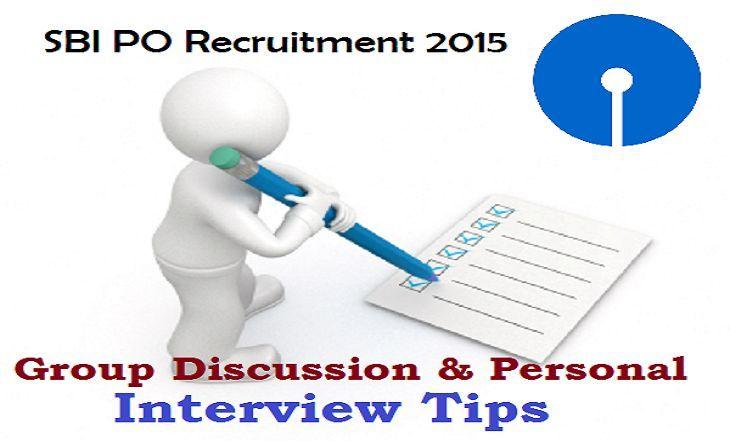
SBI PO Recruitment 2015: GD and Personal Interview Important Tips
The results for SBI PO Mains 2015 (Phase I) which was conducted on July 26 have been declared on August 24. The selection criteria for SBI PO recruitment involves three phases; a preliminary exam (Phase I) followed by a mains exam (Phase II), and then Group Discussion and Personal Interview (Phase III). Those candidates, who have cleared the SBI PO Mains exam, will now have to go through the Group Discussion (GD) and Personal Interview (PI) rounds, which are expected to take place from September 7, 2015 on wards.

Candidates will be selected on the basis of marks in written exam and interview including group discussion. Group discussion and personal interview plays an important role in selection procedure. During the interview, the panel members select only those few candidates are capable of handling the responsibility, keep calm under pressure, good command over language and updated about the current happenings of the world. Hence, candidates must prepare well for PI and GD. Here are some tips and tricks for you to prepare for interview and group discussion.
Tips & Tricks for Group Discussion (GD):
This is a platform for the candidates to interact and debate with one another in front of the panel of members who hen evaluate their performances. Here, the ability to be a team-leader is analyzed. Your analytical skills and descriptive style are also evaluated. The interviewer gives you two topics to select one of the topics for group discussion and then give 3 minutes to discuss with group for selecting the topic and after that group discussion has to start on that selected topic.

Tips:
- Dress – Wear formal attire. GD is as important as the PI and thus you must look presentable.
- Pen and Notebook – Always carry a pen and a notebook. This will allow you to note down the important points.
- Be Punctual – Punctuality is very important.
- Follow the instructions or rules – that are told by the panel members at the beginning of the session. They evaluate the candidate’s performance based on his adherence to the rules and guidelines.
- Grab the opportunity to initiate the discussion – It will be advantageous if you start the discussion. It generally leaves a good impression on the evaluator, but take the move only if you have complete knowledge of the subject.
- Confidence – Be confident, speak proper and clear. Prepare your thoughts well but do not be over-confident
- Be a good listener – Train yourself to be a good listener. Be receptive to what others have to say. Remember, it is a group discussion. Give fellow candidates a chance to speak. Respect their point of view.
- Body Language – Sit straight with a confident posture. Avoid leaning back on to the chair or playing with your pen or your fingers. Make an eye contact with all the participants. Also keep nodding, when others speak, it shows receptivity. Be careful while using gestures and do not get aggressive.
- Presence of Mind – Be calm, don’t panic and concentrate on the discussion.
- Balanced Tone – During group discussion, the tone at which you speak is very important. Your voice should be clear and audible at the same time. Some people tend to mumble or talk very loudly, avoid both.
- Focus on New Points – If you have nothing new to say, do not repeat the old points. Do not panic if no new points come to your mind. Relax. A calm and composed mind helps you think clearer and better.
- Time limit – Very important during group discussion; do not speak on irrelevant topics or be lengthy.
- Stick to your point – It is important that you take a logical stand, and defend it using a good reasoning. Remember that the discussion is both a measure of how to contribute to a group discussion and also how you can convince others to agree with you. Prove your point without getting aggressive or using foul language.
- Language – Work on your communication skills and language. Pronunciation and style of presenting should be very good.
- Enhance your debate skills – Rehearse well with your friends and family much before your actual group discussion round.
- Make a Point – If you are not agreed with someone, then just keep your point of view and behave as a professional person. When raising an objection to a point kept by another speaker, back it up with a solid reason to get the point across. Think well before you speak. You are being heard and judged upon.
- Use quotes – Use quotes, facts and figures, statements, everyday life examples to express a clear chain of thoughts.
- Grab opportunity to close the discussion and summarize it – In GD, it is mandatory to conclude the discussion by communicating the essence of discussion, some important points and if the group is in favor or against the topic. End the group discussion with a better conclusion. If the group has not reached a conclusion try concluding it. Most of the candidates forget to conclude a discussion.
- Current Affairs – The only way to prepare for GD is to read and read, develop a keen interest in current affairs and also find out the topics that are repetitively asked.
Tips & Tricks for Personal Interview (PI):
An interview is a moment of excitement as well as a moment of panic. ‘Interview’ is a two-way exchange program, a conversation, between the Interviewer and job seeker. Personal interview takes place individually for all the candidates. They gauge your General Awareness, confidence level through the PI. We advise the candidates not to neglect the personal interview. Of course personal interview session is very easy but that depends on the persons in the interview panel and it also depends on the candidate answering to the questions. Candidate should create friendly, pleasant positive mood with their skills in the interview.

Tips:
- Subject knowledge – Most of the questions that the panel members ask are from the latest happenings of the world, especially in the banking sector. Read newspapers daily and go thoroughly through the latest government policies, budget, RBI guidelines and policies.
- Mock Interview – Take a Mock Interview with your friends. Ask them to throw any question randomly which pops in their mind and try to answer them. Try planning your answers to a few questions that you know will definitely come, such as: Why are you interested in this course/job/field? What are your strengths? What are your weaknesses? Why do you think you should be selected for this role/course?
- Resume – Go through your resume, find out all the possible questions that the interviewer may ask once when he goes through your resume. Make sure you remember everything you have mentioned in it. You should be able to confidently speak about each point on your resume. Be prepared for questions pertaining to your educational qualifications, why and what made you choose the banking sector etc.
- Documents – Carry all the documents mentioned in your call letter (original and their photocopies). Also keep a copy of your resume.
- Be Punctual – Reach the venue early and arrive for the interview on time.
- Dress – Keep it formal, you should be clean and shaved (if applicable).
- Greet the interviewers – Walk in with a smile and do not forget to greet the interviewers before you take your place.
- Confidence – Be confident in yourself. Be confident in what and how you answer.
- Relax – Keep calm and take deep breaths before entering the room, this will help you to relax.
- Eye Contact – Make eye contact with the interviewer. Not making eye contact can make you look nervous and disinterested sometimes.
- Be Polite – Speak in a polite and respectful manner. Don’t rush while speaking. Speak clearly and concisely, so you express your thoughts in the best way possible.
- Be honest – If you do not know an answer to a question, tell your interviewers honestly and pass it straight away. Do not try to fool the panel members by beating around the bush and wasting time. It will do you more harm than good.
- Prepare questions, if any should be asked – Many a times, at the end of your interview, your interviewer might give you an opportunity to “ask a question”. So, research about the organization before your interview and be prepared to ask a thoughtful question, which would tell your interviewer that you are deeply interested in the job.
- Always thank the interviewers – Once the interview is over, thank the interviewers for their time and for giving you this opportunity.
Hence, these are some basic tips and tricks that will increase your level of confidence and help you stand out in the crowd. Stay tuned with us for more updates from SBI. Press CTRL+D right now to bookmark this page.